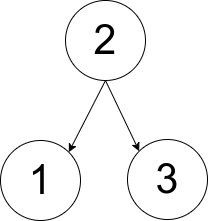You are given an array pairs, where pairs[i] = [xi,
yi], and:
- There are no duplicates.
xi < yi
Let ways be the number of rooted trees that satisfy the following
conditions:
- The tree consists of nodes whose values appeared in
pairs. - A pair
[xi, yi]exists inpairsif and only ifxiis an ancestor ofyioryiis an ancestor ofxi. - Note: the tree does not have to be a binary tree.
Two ways are considered to be different if there is at least one node that has different parents in both ways.
Return:
0ifways == 01ifways == 12ifways > 1
A rooted tree is a tree that has a single root node, and all edges are oriented to be outgoing from the root.
An ancestor of a node is any node on the path from the root to that node (excluding the node itself). The root has no ancestors.
Example 1:

Input: pairs = [[1,2],[2,3]] Output: 1 Explanation: There is exactly one valid rooted tree, which is shown in the above figure.
Example 2:

Input: pairs = [[1,2],[2,3],[1,3]] Output: 2 Explanation: There are multiple valid rooted trees. Three of them are shown in the above figures.
Example 3:
Input: pairs = [[1,2],[2,3],[2,4],[1,5]] Output: 0 Explanation: There are no valid rooted trees.
Constraints:
1 <= pairs.length <= 1051 <= xi < yi <= 500- The elements in
pairsare unique.
Difficulty:
HardLock:
NormalCompany:
UberProblem Solution
-1719-Number-Of-Ways-To-Reconstruct-A-TreeAll Problems:
Link to All Problems
All contents and pictures on this website come from the Internet and are updated regularly
every week. They are for personal study and research only, and should not be used for
commercial purposes. Thank you for your cooperation.